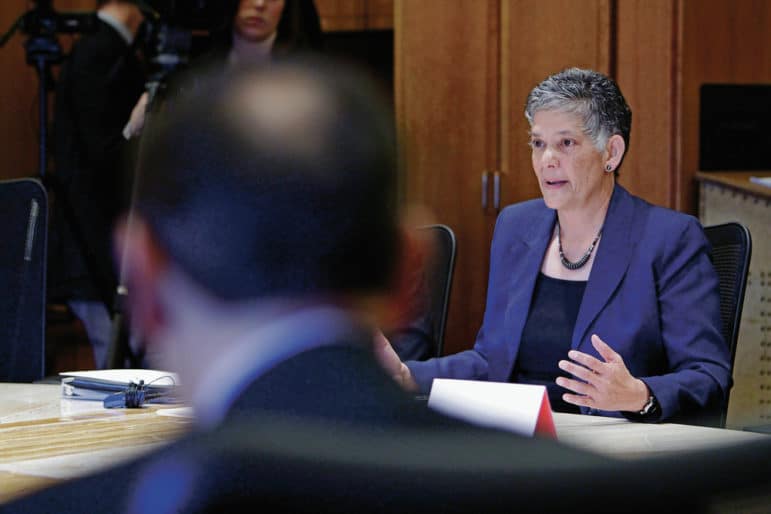
Luis Sánchez Saturno / The New Mexican
State Supreme Court Justice Judith Nakamura asks the Board of Finance on Wednesday to approve emergency funding for the courts.
The state Board of Finance on Wednesday approved up to $683,000 in emergency funding for the courts, temporarily fixing a shortfall that officials say would have brought an end to jury trials March 1 and led to furloughs of court workers.
Gov. Susana Martinez, who in recent weeks had twice vetoed extra money for the courts approved by the Legislature, chairs the Board of Finance and joined in unanimous approval of the emergency funding.
Martinez said the emergency funding is an imperfect solution.
“This is not the way to fix or permanently fix a budget situation that is not any of our faults,” Martinez said, referring to the state’s fiscal woes, which she described as being brought on by a drop in oil and natural gas prices.
The emergency funding will cover the cost of juries through mid-April. The courts are hoping legislators will provide another infusion of cash to get them through the rest of the fiscal year, which ends June 30. Court officials say the shortfall in their fund for jurors totals about $1.6 million.
The courts’ funding crisis is an example of the struggles that officials are facing in maintaining the most basic of government services because of the budget crunch. The Legislature has approved a solvency plan for the current fiscal year but still has to come up with a budget for the new year.
Finger pointing dominated the Board of Finance meeting, with some members saying the courts have a tradition of fiscal crises and that they lack confidence in the top court administrator.
The board approved up to $600,000 in emergency funding for jury trials and $82,614 for the Supreme Court to make payroll.
Justice Judith Nakamura told the board that without the money, the Supreme Court would have to furlough its roughly two dozen staff for nine days before the end of June, slowing down a court she said is already grappling with a tremendous workload.
“There has been a lot of drama over court funding for the last couple weeks and I’m not here to create soundbites,” she told the board.
But some on the board fired back at Democratic lawmakers and spent much of the nearly 2.5-hour session casting blame for the judiciary’s long-running financial problems.
Martinez listed the occasions that officials from the court system had appeared before the board to request help with their budget — eight times in as many years.
Though many judges and legislators have argued the courts are chronically underfunded, board member Robert Aragon blamed years of what he described as poor management and said he did not have any faith in the judiciary’s top administrator.
“I have zero confidence in what he tells me,” Aragon said, referring to Artie Pepin, head of the Administrative Office of the Courts, who was not at the meeting.
After the meeting, Nakamura said Pepin has the confidence of the state Supreme Court, which is responsible for hiring the judiciary’s top administrator.
Nakamura told the board that the court system could improve its efficiency in some areas but also rattled off measures it has taken to save money.
The judiciary has slashed the amount it must reimburse jurors for travel and reduced the rate of pay for jurors from $6.75 per hour to $6.25 per hour. Martinez has argued the rate is too generous, but it is not wildly different than the rates paid to jurors for a full day of service in Colorado, Utah or some Texas counties.
Still, court officials say they spend about $99,000 each week to pay jurors.
The Board of Finance turned down court officials when they requested emergency funds less than two months ago, telling them to ask the Legislature first.
Lawmakers obliged, tacking the funds onto a bill paying for the 60-day legislative session. But Martinez vetoed the bill and later scratched the money from a second piece of legislation covering costs of the session, accusing Democrats of using it as cover to avoid cutting their own budget. Martinez then called the emergency meeting of the Board of Finance to address the funding issue.
Members of the House on Monday unanimously approved money for the jury fund and the Supreme Court. Officials thought if the Senate could approve the funding Tuesday, the meeting on Wednesday of the Board of Finance would be unnecessary.
Revealing a rift between Democratic leaders in the two chambers, however, the funding bill hit a speed bump in the Senate, where it was unexpectedly assigned to two committees. It is still pending.
If the bill passes and is signed by Martinez, the courts would have to pay back the emergency funding approved by the Board of Finance.
Contact Andrew Oxford at (505) 986-3093 or aoxford@sfnewmexican.com. Follow him on Twitter at @andrewboxford.